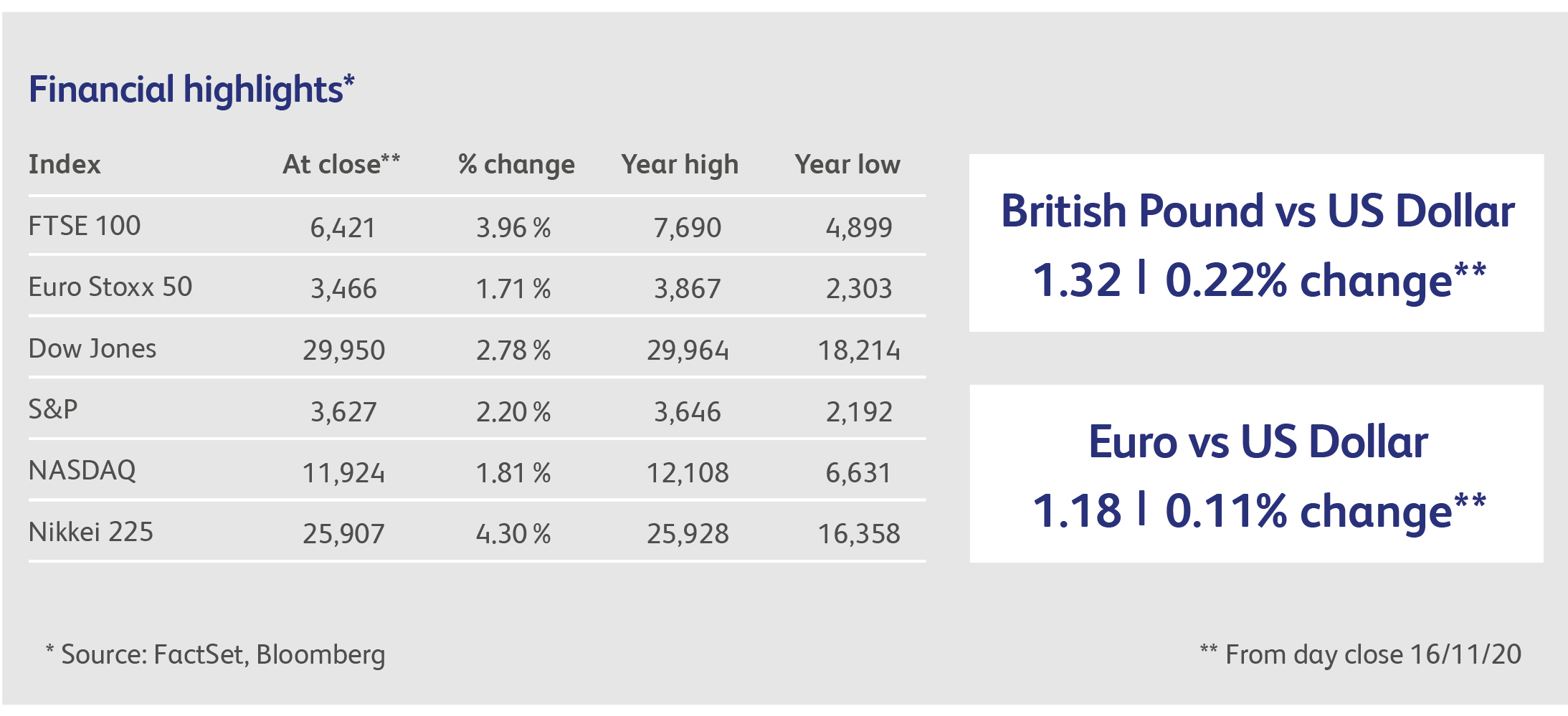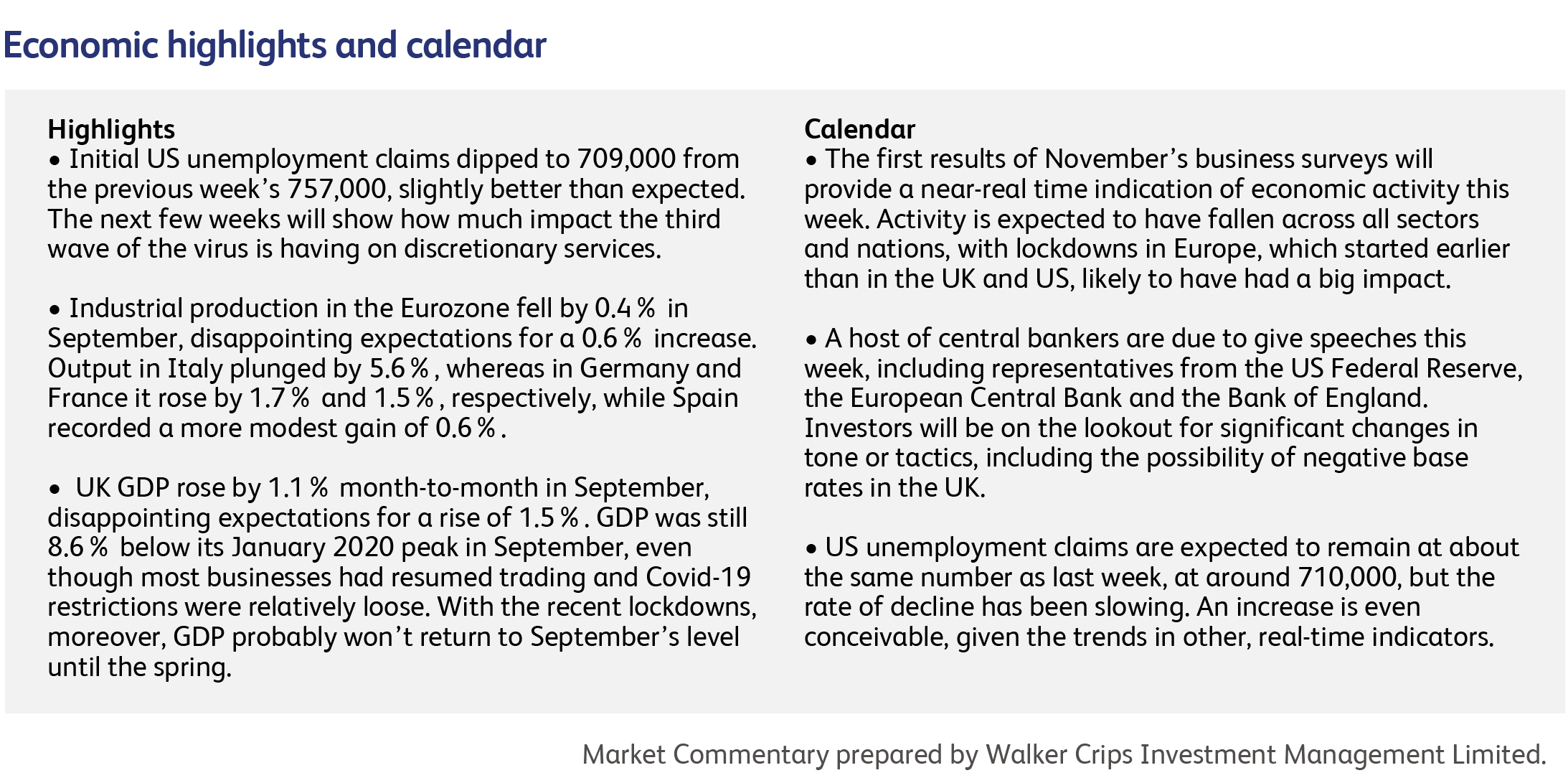
17 November 2020
Positive vaccine progress is, so far, overcoming the worsening pandemic data in the battle for investors’ attention. The virus, however, may not yet be entirely irrelevant, especially as the current wave is looking to be as bad, or potentially worse, than the initial wave in the spring. One of the weakest links is the US, where the tightening of anti-Covid restrictions across the country has a long way to run. The past week saw California, Michigan, New Jersey, New Mexico, North Dakota, Oregon and Washington state tighten controls, and that is just the start. On current trends, the US hospital system will soon start to struggle, not due to lack of beds but to lack of trained staff. Hospitalisations lag cases by about two weeks, so the current hospitalisation numbers reflect cases in early November. Case numbers have doubled since then, and are still trending rapidly upwards. Moreover, the election may have acted as a “super-spreading” event and, in a recent poll (organised by Ohio State University), 38 percent of Americans currently plan to have Thanksgiving dinner with 10 or more people. President-elect Biden’s proposal yesterday for a $2.4 trillion stimulus package was swiftly knocked back by Republicans in the Senate, so the safety net for the US economy is missing. With valuations already near record highs for many sectors, can investors’ enthusiasm bridge the gap until the effective rollout of vaccines?
Time is running out for Brexit negotiators to conclude a deal, not least because the 600-page draft agreement has to be legally checked and translated into 23 official languages. If ratification is required, it may take up to two years for the deal to be approved by EU members’ national parliaments. At the weekend, the Irish government repeated that the deal "won't be ratified" if the British government reintroduces the parts of the internal market bill struck out by the House of Lords last week. In another sign of the poor state of UK-Irish relations, and in a blow to UK exports, the Law Society of Ireland refused to allow English solicitors to practice Irish law without having a physical presence in Ireland. About four thousand (mainly City-based) English solicitors had invested in Irish qualifications in order to protect their EU practising rights after the end of the Brexit transition period.
The focus of long-term, global economic growth shifted further to the east with the signing of the Regional Comprehensive Economic Partnership (RCEP), a trade agreement covering fifteen Asia-Pacific nations including China, Japan, South Korea, Australia and New Zealand. The trade pact reduces tariffs, strengthens cross-border supply chains and codifies e-commerce rules. The region’s stockmarkets were buoyant after the deal was announced, with the biggest bounce (of about 2%) in the Nikkei 225 Index, as Japan will see tariffs eliminated on 86% of items exported to China, 81% to South Korea and 88% to Australia & New Zealand. The deal is regarded as a diplomatic coup for China, and had been a decade in the making. India, however, did not sign up, due to “concerns about getting swamped by imports under the agreement”. The presence of the US is also conspicuously lacking. The US had, previously, championed the alternative Trans Pacific Partnership (TPP), which had also been 10 years in the making, before President Trump’s decision to withdraw from that trade treaty and erect barriers to trade instead. Significant change seems unlikely: one of President-elect Biden’s first statements on trade was to refuse US government contracts to “companies that don’t make their products here in America”.

Chinese tech companies went on a roller-coaster ride as fears grew that the cancellation of Ant Financial’s listing by Chinese regulators heralded a wider clampdown on Chinese internet businesses. The announcement of new regulatory proposals wiped out $290 billion in the market value of Chinese technology companies, with Tencent and Alibaba both dropping by more than 10%. Tencent subsequently recovered about half of its losses following reassurances by the regulator.
Tesla’s share price rose by as much as 15% outside market hours after S&P Dow Jones indices announced that it will enter the blue-chip S&P 500 stockmarket index in December. With a market value of approximately $390 billion, the electric vehicle pioneer will be the biggest company ever to be added to the index. It will also be one of the index’s most influential constituents with a weighting roughly equivalent to Berkshire Hathaway, Johnson & Johnson and Procter & Gamble. It’s so big that S&P is seeking feedback from the investment community to determine if Tesla should be added all at once or in two separate pieces.
Spare a thought for Exxon Mobil, which is to be dropped from the Dow Jones Industrial Average, after spending 92 years in America’s oldest stockmarket index. Its market value has nearly halved over the past year, due mainly to the pandemic. Nevertheless, Exxon Mobil generated $17 billion in cash from revenues of $196 billion over the past year, compared with Tesla’s $4 billion in cash from revenues of $28 billion.
According to public filings Berkshire Hathaway Inc. has invested between $1.8 billion and $1.9 billion in each of the large pharmaceutical companies Merck & Co., Bristol Myers Squibb Co. and AbbVie Inc. at some point in the quarter ended September 30th. Berkshire also made a smaller investment of approximately $136 million in Pfizer Inc. The company has also made $15.7 billion of stock buybacks in the first three quarters of the year.

This publication is intended to be Walker Crips Investment Management’s own commentary on markets. It is not investment research and should not be construed as an offer or solicitation to buy, sell or trade in any of the investments, sectors or asset classes mentioned. The value of any investment and the income arising from it is not guaranteed and can fall as well as rise, so that you may not get back the amount you originally invested. Past performance is not a reliable indicator of future results. Movements in exchange rates can have an adverse effect on the value, price or income of any non-sterling denominated investment. Nothing in this document constitutes advice to undertake a transaction, and if you require professional advice you should contact your financial adviser or your usual contact at Walker Crips. Walker Crips Investment Management Limited is authorised and regulated by the Financial Conduct Authority and is a member of the London Stock Exchange. Registered office: Old Change House, 128 Queen Victoria Street, London, EC4V 4BJ. Registered in England number 4774117.
Important Note
No news or research content is a recommendation to deal. It is important to remember that the value of investments and the income from them can go down as well as up, so you could get back less than you invest. If you have any doubts about the suitability of any investment for your circumstances, you should contact your financial advisor.